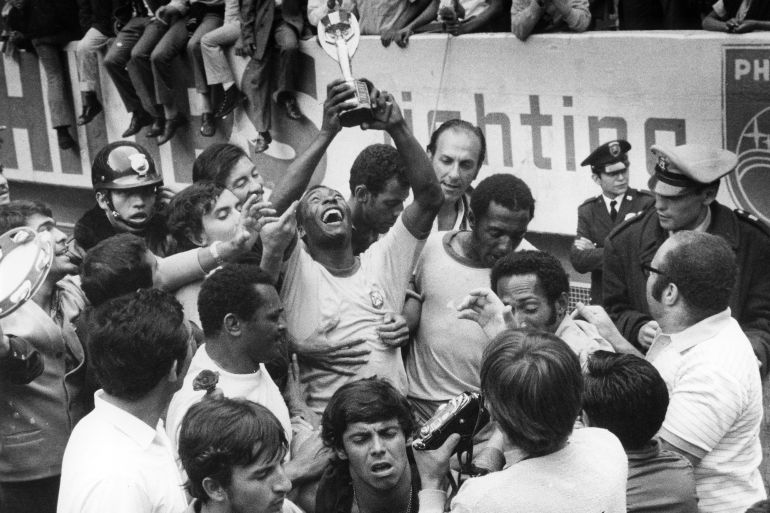World Cup 1970: Cards, political tension and guaranteed spots
El Salvador, Israel and Morocco qualified for the tournament for the first time as Africa and Asia were given a guaranteed spot by FIFA.

Host: Mexico
Teams: 16
Format: Group stage, knockouts
Matches: 32
Goals: 95
Winner: Brazil
Runners-up: Italy
Golden boot: Gerd Mueller (Germany)
Background
The World Cup made it to North America for the first time and became the first to have representation from six continents.
Keep reading
list of 4 itemsWorld Cup 1958: When Pele guided Brazil to its first title
Lobbying, clashes and Brazil’s supremacy at FIFA World Cup 1962
World Cup 1966: Africa’s boycott, Pele’s injury, England’s trophy
FIFA gave Africa and Asia guaranteed spots, and El Salvador, Israel and Morocco qualified for the tournament for the first time.
Morocco and Israel were kept apart when groups were drawn to avoid any political disputes and withdrawals.
The use of yellow and red cards was introduced. Teams were also allowed to make substitutions for the first time in the tournament. They were limited to two.
It was the first tournament to have an official match ball, Telstar, manufactured by Adidas.
The tournament was held across five cities. The final was played at Azteca Stadium in Mexico City with a capacity of 100,000 people.
The Brazilian team of the 1970 World Cup is widely regarded as the greatest of all time due to its high scoring and attacking style of play. It won all six matches and scored 19 goals on its way to a third World Cup title.
It was Pele’s last World Cup, and he left after making his mark in the final. He scored Brazil’s first goal and made assists for the third and fourth goals. They led to a 4-1 victory over Italy.
By winning three World Cups, Brazil got to keep the Jules Rimet Trophy. The golden World Cup trophy was introduced in 1974.
Highs
The 1970 World Cup was the first to be broadcast in colour. It also had an average match attendance of 50,000 for the first time.
It’s been called the greatest World Cup ever because of Brazil’s golden team and Pele’s last appearance in the tournament.
Brazil’s Jairzinho became known as the “World Cup Hurricane” after scoring a goal in every one of his team’s matches.
Lows
Matches were played in the afternoon during the hottest part of day, so they could be broadcast during prime evening viewing hours in Europe.